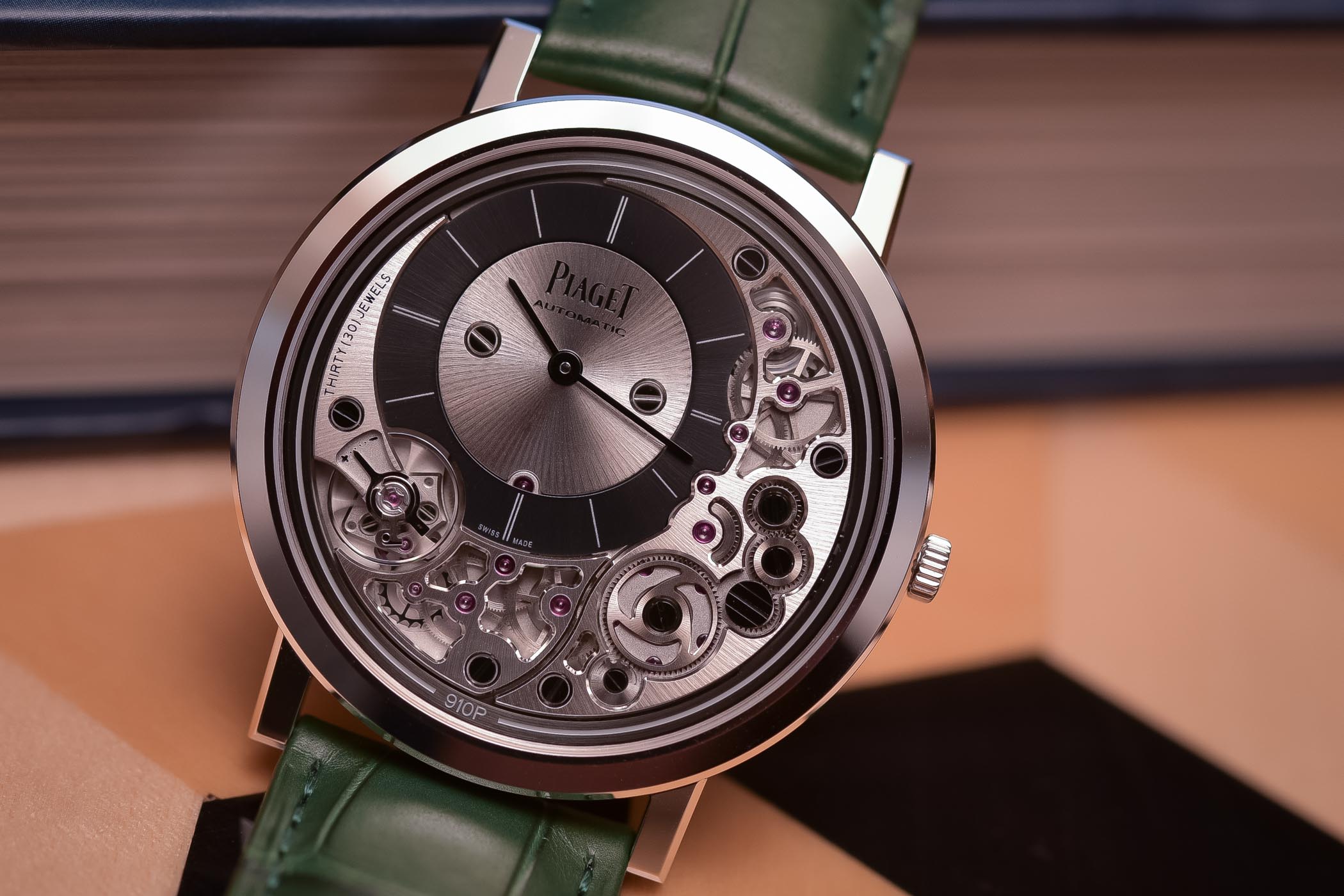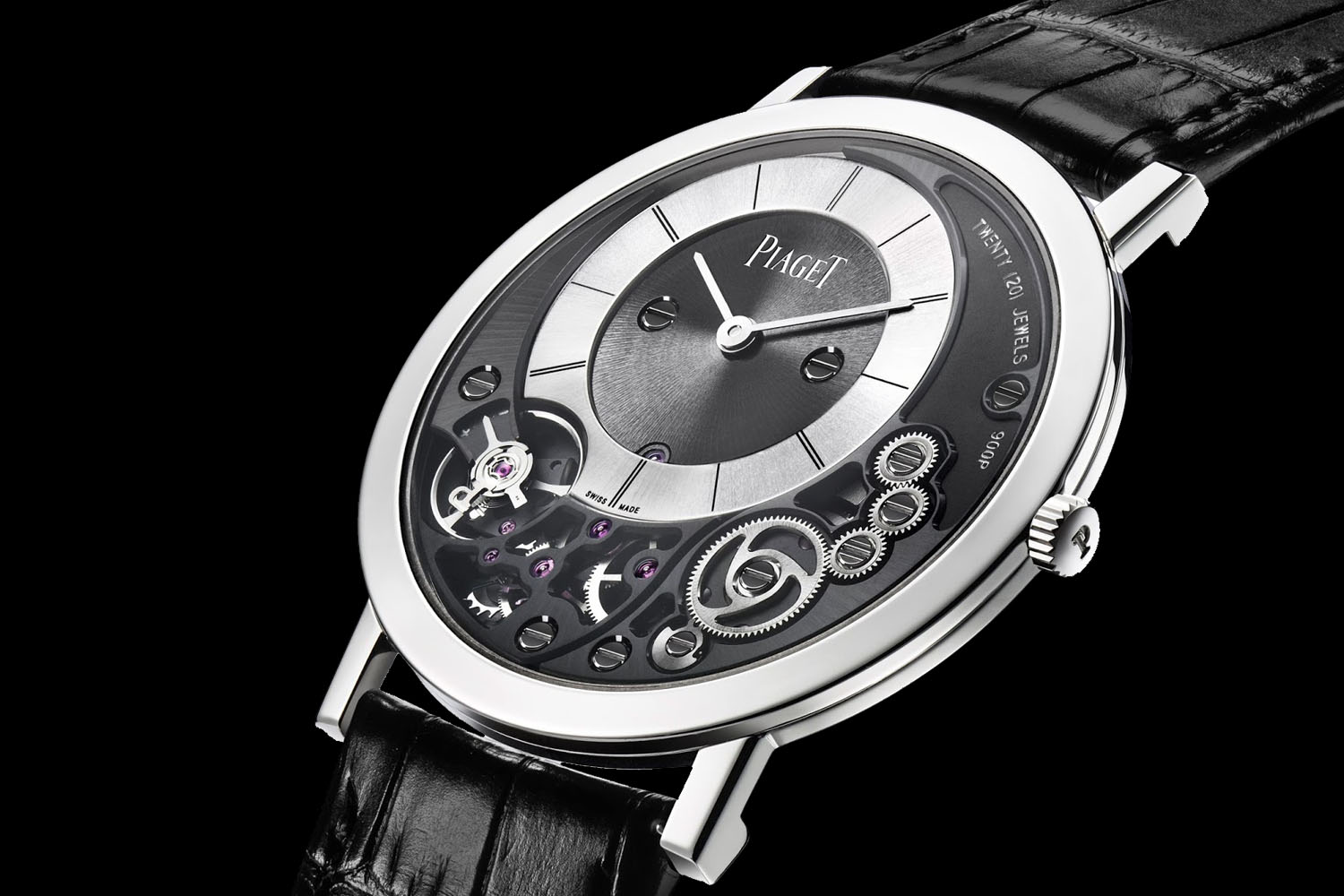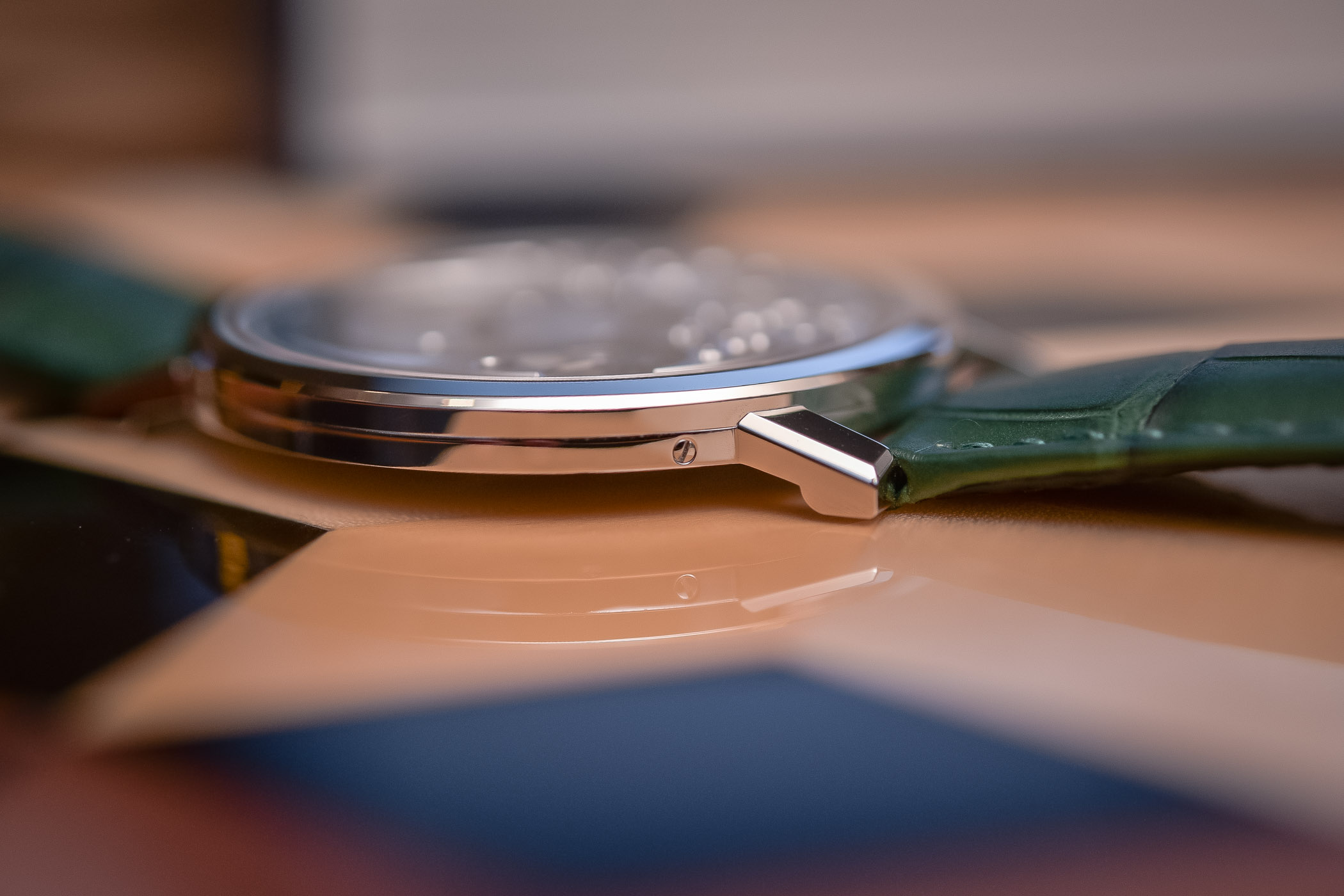Review – The Piaget Altiplano Ultimate Automatic 910P, The New World’s Thinnest Automatic Watch

Piaget and ultra-thin are two words that go together very well. For over 60 years now, the brand has developed a true expertise in ultra-thin watches and movements (don’t forget that Piaget started its life as a movement manufacturer and not as a jeweller). From the Calibre 9P to the recent 900P, the brand has gone from one world-record to another. Last year, a certain Italian-rooted brand unveiled what was the thinnest automatic movement in current production… Today Piaget responds with their answer. They took one the thinnest hand-wound watches in the world, the Altiplano 900P, and added a peripheral rotor making it an automatic. And not just an automatic but the world’s thinnest automatic wristwatch.
Piaget and the Concept of Ultra-Thin
Piaget was founded in 1874, in the village of La Côte-aux-Fées, as a movement manufacturer. From 1913 onwards, the manufacturer appeared in watch industry supplier catalogues as the specialist of ultra-thin components. The main evolution in this quest for thinness was engaged by Valentin Piaget (who passed away recently, on April 27, 2017), grandson of Piaget’s founder, in the 1940s.
The Piaget Calibre 9P, hand-wound movement, 2mm thick
Not only the producer of ultra-thin movements, the brand would become the reference manufacture for ultra-thin watches. The pivotal step in this process was the launch of the manual-winding 9P calibre. One of the world’s thinnest movements of its kind at the time, measuring just 2 mm thick, it was presented at the Basel Fair in 1957. The launch of the 9P went along with the introduction of a future icon, the Piaget Altiplano.
The Piaget Calibre 12P, automatic via micro-rotor, 2.3mm thick
Soon after the calibre 9P, Piaget created an automatic movement characterized by the same quest for thinness, the Calibre 12P. At only 2.3mm thick, it was back then (and still was up until a few years ago) the thinnest automatic movement available in serial production. These record dimensions were made possible by the use of a 24-carat gold micro-rotor integrated within the movement so as to ensure efficient mainspring winding.
The Piaget Altiplano with calibre 900P, for a period of 2 years, the world’s thinnest mechanical watch
Fast-forward to 2014, with the Piaget Altiplano 900P, which was the world’s thinnest mechanical watch at the time of its creation. We can’t really talk about the thickness of the movement here, as the calibre is properly integrated into the watch. The Altiplano 900P is, all together, 3.65mm thick. Everything done before was over 4.00mm in height – the previous record-holder was JLC, with the Master Ultra-Thin Jubilee, at 4.05mm. With the 900P, Piaget developed an impressive architecture to save height. The classical way to build a watch is simple and known: take a movement, enclose it into a case, usually composed of 3 main parts, the central container in the middle, the bezel/crystal on top, the case-back on the bottom.
With the 900P, Piaget created something different. The case-back is actually machined with holes and recesses to become the main-plate of the movement. Wheels, gears and technical parts (barrel, escapement, regulating organ) are directly mounted on the case-back, with bridges on top to hold the moving parts in place. Then and only then, the bezel/crystal assembly can be attached. This explains the extreme thinness achieved by Piaget – even if in 2015, Jaeger-LeCoultre introduced the Master Ultra-Thin Squelette, with a 3.60mm case.
Talking automatic watches, the current record-holder is Bulgari with the Octo Finissimo Automatic, with a movement that measures only 2.23mm in height – thus slightly thinner than the calibre 12P, at 2.30mm, and than the current calibre 1200P by Piaget, at 2.35mm – and a case measuring 5.15mm in height. Still, Piaget has some history and pedigree in the field of ultra-thin watches, and they had to react… Please welcome the Piaget Altiplano Ultimate Automatic 910P and its case measuring 4.30mm in height – and that’s the new world’s thinnest automatic wristwatch ever, period!
The Piaget Altiplano Ultimate Automatic 910P
What is the Piaget Altiplano Ultimate Automatic 910P? In short, it represents another demonstration of expertise by Piaget. What they have done here is to reduce the size of the whole watch from 5.25mm in their previous thinnest automatic watch (the Altiplano Automatique with Calibre 1208P) to an astonishing 4.30mm thick in the new 910P. However, don’t believe that achieving such record dimensions is an easy task. In fact, every single aspect of the construction of a watch has to be re-defined and approached in a different way. Complications were encountered at each step of the development.
The whole concept behind the creation of the Altiplano Ultimate Automatic 910P is based on the researches done on the 900P, which was, when launched in 2014, the thinnest mechanical watch available on the market – with a case that measures only 3.65mm in height. The creation of the 900P was made possible by combined expertise of Piaget’s two integrated manufactures: one in Geneva for the conception of the “habillage” (external parts of the watch), one in La Côte-aux-Fées where the movements are developed. People had to team up and to think as a whole, to finally achieve something quite innovative: the movement is assembled directly onto the case, and isn’t the union of two separated elements anymore.
To gain space, by removing one of the usual layers, and add strength to the case/movement assembly, the Altiplano 38mm 900P introduced a unique conception where the main-plate of the movement (the large plate where all the moving parts are mounted) doesn’t exist anymore as a stand-alone piece. This main-plate was merged with the case-back, which was machined with recesses and holes where the moving parts are mounted directly. Also, as you can see, the movement is built around the plate that serves as a dial, and not underneath it, again saving space. The new Piaget Altiplano Ultimate Automatic 910P takes advantages of this construction, as well as most of the movement’s parts of the 900P but adds a self-winding mechanism. However, here again, they couldn’t do it the easy way, with a centrally mounted rotor. This would have meant an automatic bridge with a rotor on top, something that is usually over 1mm thick.
The integration of the self-winding capacity in the 910P has been done via a peripheral rotor. The rotor is not turning over or inside the movement but around the movement. This way, Piaget avoids the 1mm or more needed by a centrally mounted rotor. Also, a micro-rotor, considering the lack of space available in this movement, was impossible to implement here.
The oscillating weight, which can be seen here in black with a “910P” engraving, is in 22K gold with black PVD coating. The choice of gold is simple: more weight means more inertia means a better winding efficiency – in fact, this peripheral rotor is even more efficient than a micro-rotor. This whole architecture allows for both an effective winding and a thin profile. The rotor is connected to the movement via ball-bearings (visible at 2).
The rest of the movement, on the other side, remains equal to the 900P, with the same architecture and the same specifications. We have the fully exposed movement, with wheels (some are 0.12mm thick only), gears, escapement, barrel visible on the dial side. Even if it is record-thin, this watch remains rather traditional in the materials and technical solutions used. The escapement is a traditional Swiss-lever, most parts are done in brass or steel and the decoration is very pleasant, yet classical (chamfered and polished bridges).
Such a thinness can, however, cause unexpected issues. One of them was the possible deformation of the crystal that could cause the hands to stop when pressing. For this reason, the highest point of the watch is not the axis of the hands (as it usually is) but the bridge that holds the moving parts in place. If the crystal is distorted due to pressure, it no longer pushes on the hands, but instead on the gear-train bridge and thus has no effect on the running of the movement.
Another issue caused specifically on this 910P was the way the bezel is attached to the case. Because of the peripheral rotor that rotates underneath the bezel, the latter couldn’t be fixed by vertical screws passing through the watch from the case-back. As you can see in the profile picture above, the bezel is fixed with screws inside the case-band.
As for the movement itself, it retains its 3Hz frequency and a very decent 50-hour power reserve – which is even quite good knowing the thinness of the watch and the small size of the barrel (a suspended barrel, held by a single bridge on the dial side, contrary to standard barrels that are also fixed on the main plate side). The Piaget Altiplano Ultimate Automatic 910P is also slightly larger than its hand-wound sister, the 900P. In order to have some space for the peripheral rotor, the case diameter has been increased from 38mm to 41mm here. Altogether, knowing that the 910P is slightly thicker than the 900P, this increased diameter is not especially disturbing. It is available in two different editions, in 18k rose gold or in 18k white gold.
The Piaget Altiplano Ultimate Automatic 910P will be part of the standard collection (not a limited or numbered edition). Prices are CHF 26,000 (before taxes) in pink gold and CHF 27,000 (before taxes) in white gold. An impressive watch, until another one comes and does even better (maybe by Piaget themselves). More details on www.piaget.com.
Technical Specifications – Piaget Altiplano Ultimate Automatic 910P
- Case: 41mm diameter x 4.30mm height – white or pink gold, polished – sapphire crystal on the dial side – water resistance to be confirmed
- Movement: Calibre 910P, in-house – automatic via peripheral rotor – 3Hz frequency – 50-hour power reserve – hours and minutes
- Strap: alligator leather with gold pin buckle
- Reference: G0A43120 (pink gold) – G0A43121 (white gold)
- Price: CHF 26,000 or CHF 27,000 (before taxes)


















2 responses
What an accomplishment by Piaget. Beautiful timepiece, very desirable with both bands.
Great article, Thank You Mr. Goulard.
Seems to wear large on the wrist, and while not “alarming” it’s certainly conspicuous. Gorgeous watch, technically very sophisticated, I wonder if it feels as light as it is thin.